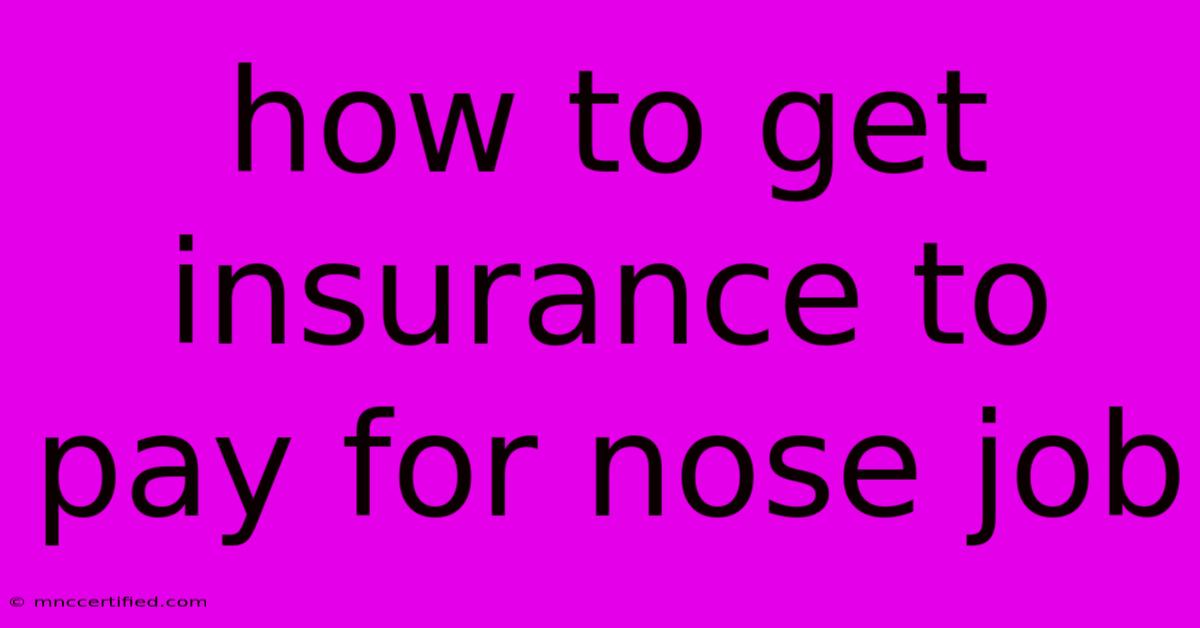How To Get Insurance To Pay For Nose Job

Table of Contents
Can Insurance Cover a Nose Job? A Comprehensive Guide
A nose job, or rhinoplasty, is a common cosmetic surgery that can improve both the appearance and function of your nose. While it's often considered an elective procedure, there are circumstances where insurance might cover the cost.
Understanding When Insurance May Cover Rhinoplasty
Insurance companies generally consider rhinoplasty a cosmetic procedure unless it addresses a medical necessity. This means you'll need a compelling medical reason for the surgery to qualify for coverage. Here are some scenarios where your insurance may cover a nose job:
- Breathing Difficulties: If your nose structure is interfering with your breathing, causing problems like chronic sinus infections, sleep apnea, or nasal obstruction, your insurance might cover the surgery.
- Deviated Septum: A deviated septum, where the nasal septum (the wall dividing the nasal passages) is off-center, can significantly impact breathing. This is a common medical reason for insurance coverage.
- Congenital Defects: If you have a birth defect that affects your nose structure and impacts breathing or facial development, insurance is more likely to cover rhinoplasty.
- Injuries: If a previous injury damaged your nose, leading to breathing problems or functional issues, insurance might cover the necessary surgery.
How to Increase Your Chances of Coverage
While these are common reasons for insurance coverage, it's important to understand that each insurance company has its own criteria. Here's how to increase your chances of getting your nose job covered:
- Consult with a Doctor: The first step is to consult with a qualified plastic surgeon or otolaryngologist (ENT). They can assess your medical condition and determine if you have a legitimate medical reason for surgery.
- Obtain a Doctor's Letter: Once your doctor confirms a medical necessity for rhinoplasty, they'll need to write a letter explaining the condition and why the surgery is required. This letter will be crucial for your insurance claim.
- Provide Detailed Medical Records: Gather all relevant medical records, including previous treatments, diagnosis reports, and any imaging scans. These records will support your doctor's explanation and strengthen your claim.
- Negotiate with Your Insurance Company: Don't hesitate to contact your insurance provider to discuss your case and understand their specific requirements for covering rhinoplasty.
- Explore Other Options: If your insurance doesn't cover the full cost, consider exploring financing options, medical loan programs, or payment plans offered by your surgeon.
Important Considerations
- Pre-Existing Conditions: If you have a pre-existing condition that might impact your rhinoplasty, it's essential to disclose it to your doctor and insurance company.
- Cosmetic Procedures: If your primary motivation for a nose job is purely cosmetic, your insurance is unlikely to cover it.
- Alternatives: Before deciding on rhinoplasty, discuss alternative treatments with your doctor, such as nasal sprays or medications, to see if they address your concerns.
Conclusion
While getting your nose job covered by insurance can be challenging, it's not impossible. By understanding the criteria, gathering the necessary documentation, and communicating effectively with your doctor and insurance company, you can increase your chances of obtaining coverage. Remember, your health and well-being should always be prioritized, and open communication with your healthcare providers is essential throughout this process.

Thank you for visiting our website wich cover about How To Get Insurance To Pay For Nose Job. We hope the information provided has been useful to you. Feel free to contact us if you have any questions or need further assistance. See you next time and dont miss to bookmark.
Featured Posts
-
Power Of Attorney For Insurance Purposes
Nov 08, 2024
-
Frederick Forsyths The Day Of The Jackal Review
Nov 08, 2024
-
Malone Praises Westbrooks Defensive Impact
Nov 08, 2024
-
Ravens Vs Bengals Key Players And Stats
Nov 08, 2024
-
Watch Live Manchester United Vs Paok Europa League
Nov 08, 2024